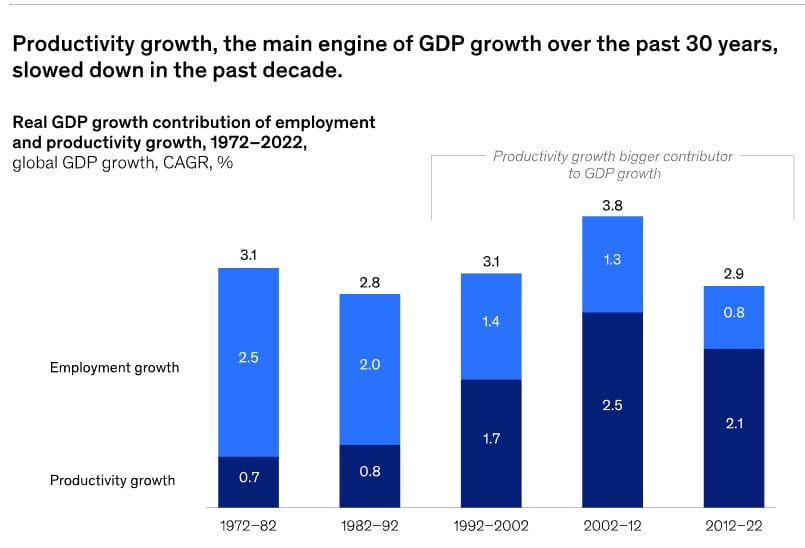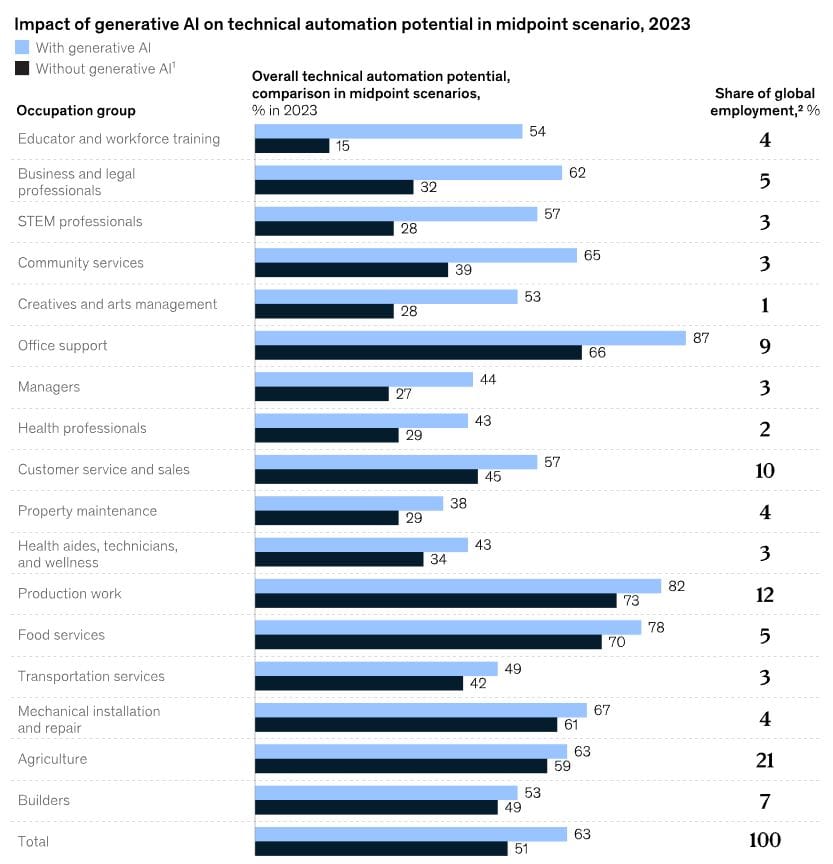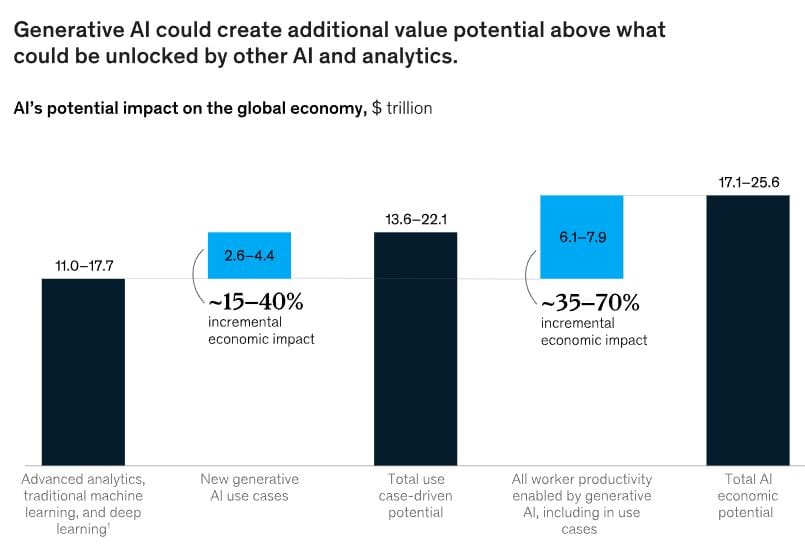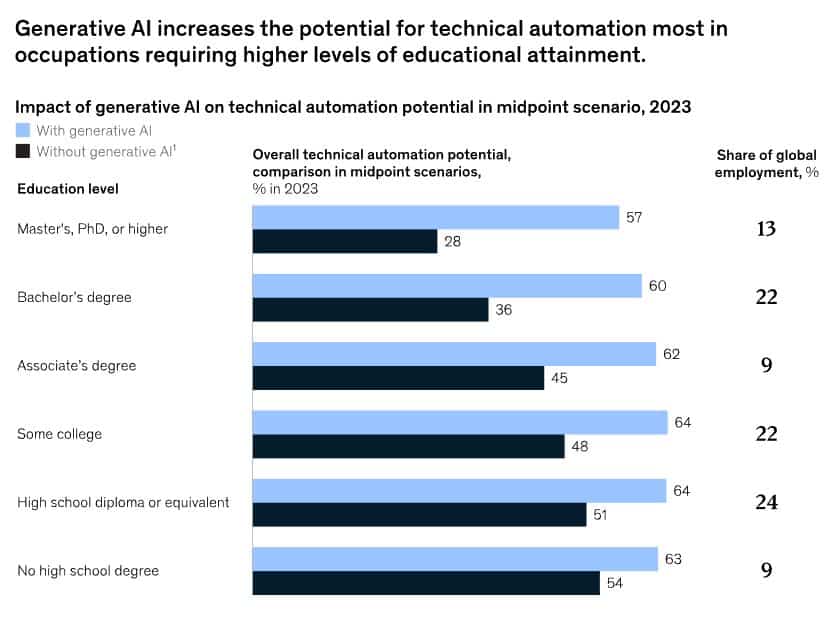McKinsey: AI to Create $4.4 Trillion in Annual Economic Impact


In Brief
AI is projected to contribute $4.4 trillion annually to the global economy, and its automation of work tasks could be achieved as early as 2060.
AI has become a part of our lives without us even realizing it. It’s present in the technology that powers our smartphones, the autonomous-driving features in cars, and the tools that retailers use to surprise and delight consumers. Its progress has been gradual and often unnoticed. While there have been notable milestones, like when AlphaGo defeated a world champion Go player in 2016, these achievements quickly faded from public consciousness.

A new wave of generative AI applications is capturing the imagination of people around the world. Unlike AlphaGo, these applications have broad utility and can be used by almost anyone to communicate and create. They possess an uncanny ability to hold conversations with users, making them more accessible and appealing.
These latest generative AI applications can perform various routine tasks such as data reorganization and classification. But it’s their talent for writing text, composing music, and creating digital art that has gained attention and enticed consumers to experiment on their own. As a result, a wider range of people are now grappling with the impact of generative AI on business and society, but often without the necessary context to fully comprehend it.
The speed at which generative AI technology is advancing adds another layer of complexity. ChatGPT was released in November 2022, and just four months later, OpenAI introduced GPT-4, a large language model with significant improvements. Anthropic’s generative AI, Claude, also made significant progress in a short time, being able to process 100,000 tokens of text in a minute by May 2023. Google announced new features powered by generative AI, including Search Generative Experience and PaLM 2, a new language model that will enhance its Bard chatbot and other products.
According to a recent report by McKinsey, generative AI is projected to contribute a staggering $4.4 trillion annually to the global economy. This mind-boggling figure highlights the transformative power of AI and its potential to reshape various industries.
The report also sheds light on the shifting timeline for the full automation of work. Previously, experts predicted that AI would automate half of all work between 2035 and 2075. However, the latest findings indicate that this milestone could be achieved as early as 2060. This acceleration in the adoption and implementation of AI technologies demonstrates the rapid pace of development and the far-reaching effects they are having on our society.

One of the key economic advantages of generative AI lies in its ability to automate work tasks across different sectors. From client interaction and sales to software development and research, AI systems can streamline processes, improve efficiency, and enhance productivity. By taking over routine and repetitive tasks, generative AI allows human professionals to focus on more complex and strategic aspects of their work.

It is critical to address one of the primary concerns about generative AI: the dependability of the content it generates. The report emphasizes the importance of stringent regulation and oversight to ensure that AI-generated content is ethical and trustworthy. As policymakers and organizations recognize the importance of maintaining accountability and accuracy in AI systems, this issue has gained traction and is now receiving the attention it deserves.

An intriguing observation from the report is the evolving vulnerability of the educated workforce. Traditionally, it was manual occupations that were considered most at risk of automation. With the advent of new technologies like AI, even highly skilled professionals are facing potential disruptions in their industries. This realization underscores the far-reaching impact of AI, as it permeates every sector and transforms the nature of work.

Read more about AI:
Disclaimer
In line with the Trust Project guidelines, please note that the information provided on this page is not intended to be and should not be interpreted as legal, tax, investment, financial, or any other form of advice. It is important to only invest what you can afford to lose and to seek independent financial advice if you have any doubts. For further information, we suggest referring to the terms and conditions as well as the help and support pages provided by the issuer or advertiser. MetaversePost is committed to accurate, unbiased reporting, but market conditions are subject to change without notice.
About The Author
Damir is the team leader, product manager, and editor at Metaverse Post, covering topics such as AI/ML, AGI, LLMs, Metaverse, and Web3-related fields. His articles attract a massive audience of over a million users every month. He appears to be an expert with 10 years of experience in SEO and digital marketing. Damir has been mentioned in Mashable, Wired, Cointelegraph, The New Yorker, Inside.com, Entrepreneur, BeInCrypto, and other publications. He travels between the UAE, Turkey, Russia, and the CIS as a digital nomad. Damir earned a bachelor's degree in physics, which he believes has given him the critical thinking skills needed to be successful in the ever-changing landscape of the internet.
More articles

Damir is the team leader, product manager, and editor at Metaverse Post, covering topics such as AI/ML, AGI, LLMs, Metaverse, and Web3-related fields. His articles attract a massive audience of over a million users every month. He appears to be an expert with 10 years of experience in SEO and digital marketing. Damir has been mentioned in Mashable, Wired, Cointelegraph, The New Yorker, Inside.com, Entrepreneur, BeInCrypto, and other publications. He travels between the UAE, Turkey, Russia, and the CIS as a digital nomad. Damir earned a bachelor's degree in physics, which he believes has given him the critical thinking skills needed to be successful in the ever-changing landscape of the internet.


















































